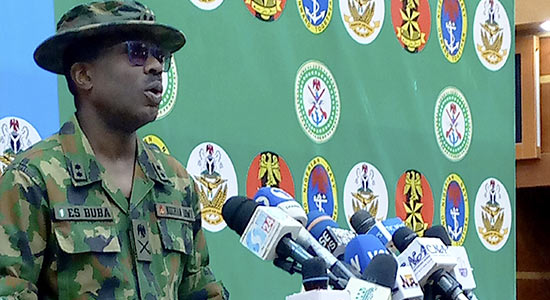The Nigerian government, through its Defence Headquarters (DHQ), has begun investigating claims of banditry sponsorship in the North-West region, a hotspot for violent attacks in recent years. This development was disclosed by Major General Edward Buba, the Director of Media Operations at the DHQ, during a press briefing in Abuja on Thursday, September 26, 2024.
The investigation follows a public feud between two prominent politicians—Bello Matawalle, the Minister of State for Defence and former governor of Zamfara, and his successor, Dauda Lawal. Both figures have been accused of having ties to bandit groups operating in the region. These accusations have led to increased public scrutiny, as banditry has severely affected the socio-economic stability of the North-West, particularly in states like Zamfara, Katsina, and Sokoto.
Banditry in these areas has been marked by armed groups engaging in kidnapping, cattle rustling, and other violent crimes, resulting in thousands of deaths and displacements. The surge in bandit attacks has also disrupted farming and other economic activities, contributing to food insecurity.
While the allegations against the two politicians remain under investigation, Maj. Gen. Buba was quick to clarify that the Nigerian military is not directly responsible for investigating sponsorship claims. “When you talk about what’s going on with the sponsors, I can assure you that the relevant agencies responsible for such investigations are doing their job,” he said. He further hinted that official updates would soon be provided to the public.
In the meantime, Maj. Gen. Buba emphasized that the military remains focused on its broader objective of defeating banditry and restoring peace to the affected regions. He outlined the military’s strategy as one focused on destroying the enemy’s will to fight. “Winning a war is not just about fighting on the battlefield; it’s about breaking the enemy’s spirit and will to fight. Once that’s done, the war is won,” he explained.
This statement reflects the Nigerian military’s ongoing campaigns against bandits, which include ground offensives, airstrikes, and intelligence-gathering missions aimed at disrupting bandit networks. However, despite these efforts, banditry remains a persistent problem, largely due to the rugged terrain of the North-West and the mobility of these armed groups.
The allegations of political figures being linked to banditry sponsorship have sparked widespread concern among citizens, many of whom believe that such claims, if proven true, could explain the resilience of bandit groups in the region. Some security experts have speculated that the involvement of powerful individuals might have provided these criminals with access to resources, protection, or even intelligence that has allowed them to evade military efforts.
Citizens are now eagerly awaiting the results of the investigation, hoping that those found guilty of such treachery will face justice. It is also believed that the findings could shape future policies and strategies aimed at combating banditry, as the involvement of insiders might require a different approach to eliminating the problem.
While the military is committed to breaking the will of bandits, many analysts argue that a lasting solution to banditry requires addressing the root causes of the problem. The rise of banditry in the North-West is often attributed to a combination of factors, including poverty, unemployment, lack of education, and the weakening of traditional governance structures in rural areas. Armed groups, in many cases, exploit these vulnerabilities to recruit young men into their ranks.
In recent years, the Nigerian government has launched several initiatives aimed at addressing these underlying issues, including job creation programs, security summits, and peace dialogues with local communities. However, progress has been slow, and the ongoing violence has continued to hinder development efforts.
As the investigation into the alleged sponsorship of banditry continues, the Nigerian government faces mounting pressure to hold those responsible accountable. Meanwhile, the military is focused on intensifying operations against bandit groups, hoping to weaken their hold over the North-West region.
For now, Nigerians await further updates from the DHQ and other security agencies, with the hope that these investigations will lead to a significant breakthrough in the fight against banditry. With the military’s continued efforts to destroy the bandits’ will to fight, combined with ongoing government initiatives to address underlying socio-economic challenges, there is cautious optimism that the region can eventually experience peace and stability.







